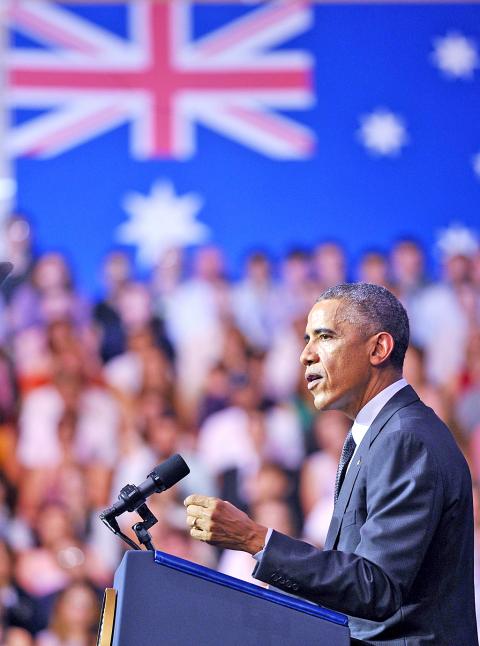US President Barack Obama sought yesterday to reassure Asia-Pacific allies about Washington’s strategic shift toward the region as he sent a veiled message to China with a vow to “deepen our engagement using every element of our power.”
Speaking at the University of Queensland in Brisbane, Australia, where he is attending a G20 summit, Obama insisted that Asia’s security order must not be based on “coercion or intimidation ... where big nations bully the small, but on alliances for mutual security.”
Although Obama did not explicitly point the finger at China, there was little doubt that he was alluding to Beijing’s maritime disputes with its neighbors and growing concern in the region about its military build-up.

Photo: AFP
“No one should ever question our resolve or our commitments to our allies,” he said.
Obama, who visited Beijing for an Asia-Pacific summit this week and held talks with Chinese President Xi Jinping (習近平), sought to show renewed resolve to follow through on his much-touted “pivot” to the region, involving military, diplomatic and economic assets.
The policy is widely seen as intended to counter China’s rising influence, although Obama, at a news conference with Xi earlier in the week, denied there was any desire to contain Beijing.
However, many in Asia are looking for further proof that the policy is real, especially with Obama’s agenda dominated by crises ranging from the battle against Islamic State militants and the conflict in Ukraine, to the spread of Ebola.
Obama made clear that in addition to security, Washington is determined to expand trade, a goal underscored by efforts to forge a trans-Pacific trade partnership in difficult negotiations that so far exclude China.
However, even as Obama hailed the region’s “dynamism,” he warned of potential threats.
“We see dangers that could undermine this progress,” he said, citing North Korea’s nuclear and missile programs, disputes over territory that threaten to spiral into confrontation and the failure to uphold universal human rights.

CHAOS: Iranians took to the streets playing celebratory music after reports of Khamenei’s death on Saturday, while mourners also gathered in Tehran yesterday Iranian Supreme Leader Ayatollah Ali Khamenei was killed in a major attack on Iran launched by Israel and the US, throwing the future of the Islamic republic into doubt and raising the risk of regional instability. Iranian state television and the state-run IRNA news agency announced the 86-year-old’s death early yesterday. US President Donald Trump said it gave Iranians their “greatest chance” to “take back” their country. The announcements came after a joint US and Israeli aerial bombardment that targeted Iranian military and governmental sites. Trump said the “heavy and pinpoint bombing” would continue through the week or as long

TRUST: The KMT said it respected the US’ timing and considerations, and hoped it would continue to honor its commitments to helping Taiwan bolster its defenses and deterrence US President Donald Trump is delaying a multibillion-dollar arms sale to Taiwan to ensure his visit to Beijing is successful, a New York Times report said. The weapons sales package has stalled in the US Department of State, the report said, citing US officials it did not identify. The White House has told agencies not to push forward ahead of Trump’s meeting with Chinese President Xi Jinping (習近平), it said. The two last month held a phone call to discuss trade and geopolitical flashpoints ahead of the summit. Xi raised the Taiwan issue and urged the US to handle arms sales to

State-run CPC Corp, Taiwan (CPC, 台灣中油) yesterday said that it had confirmed on Saturday night with its liquefied natural gas (LNG) and crude oil suppliers that shipments are proceeding as scheduled and that domestic supplies remain unaffected. The CPC yesterday announced the gasoline and diesel prices will rise by NT$0.2 and NT$0.4 per liter, respectively, starting Monday, citing Middle East tensions and blizzards in the eastern United States. CPC also iterated it has been reducing the proportion of crude oil imports from the Middle East and diversifying its supply sources in the past few years in response to geopolitical risks, expanding

OTHER OPTIONS: Given possible US intervention and Taiwanese counterattacks, China might opt to blockade Taiwan or take its outlying islands instead of an all-out invasion A US think tank has urged Taiwan to adopt a “hellscape” strategy that would flood the Taiwan Strait with drones and other uncrewed systems to deter invasion by China. In its report, Hellscape for Taiwan, published on Thursday, the Center for a New American Security said Taipei’s asymmetric defense approach — often described as a “porcupine strategy” — needs to evolve to keep pace with the growing capabilities of the Chinese People’s Liberation Army. The “hellscape” strategy involves saturating the air and waters around Taiwan with thousands of drones and other platforms capable of striking invading forces from multiple domains at once. Long-range